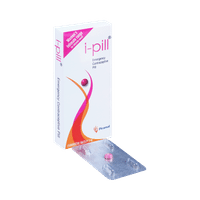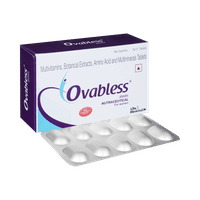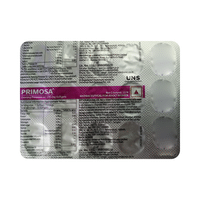food interaction for Ventablets Plus
alcohol interaction for Ventablets Plus
pregnancy interaction for Ventablets Plus
lactation interaction for Ventablets Plus
food
alcohol
pregnancy
lactation
Ventablets Plus 100mg/0.5mg Tablet may be taken with or without food, but it is better to take it at a fixed time.
None
None
CAUTION
It is unsafe to consume alcohol with Ventablets Plus 100mg/0.5mg Tablet.
UNSAFE
Ventablets Plus 100mg/0.5mg Tablet is unsafe to use during pregnancy as there is definite evidence of risk to the developing baby. However, the doctor may rarely prescribe it in some life-threatening situations if the benefits are more than the potential risks. Please consult your doctor.
CONSULT YOUR DOCTOR
Ventablets Plus 100mg/0.5mg Tablet is probably unsafe to use during breastfeeding. Limited human data suggests that the drug may pass into the breastmilk and harm the baby.
CONSULT YOUR DOCTOR
SALT INFORMATION FOR Ventablets Plus
Desvenlafaxine(100mg)
Uses
Desvenlafaxine is used in the treatment of depression.
How it works
Desvenlafaxine works by increasing the levels of chemical messengers (serotonin and noradrenaline), natural substances in the brain that help maintain mental balance.
Common side effects
Anxiety, Constipation, Decreased appetite, Dizziness, Insomnia (difficulty in sleeping), Nausea, Agitation, Blurred vision, Decreased libido, Diarrhea, Dilatation of pupil, Dryness in mouth, Fatigue, Headache, Sleepiness, Tremors, Vertigo, Weakness, Sweating, Vasodilation, Dyslipidemia, Anorgasmia (decreased orgasm), Abnormal dreams, Nervousness, Tachycardia, Weight gain, Musculoskeletal (bone, muscle or joint) pain, Fainting, Hypotension (low blood pressure), Urinary retention, SIADH (water retention due to excessive ADH), Torsade de pointes, Blood system abnormalities, Lymphatic system abnormalities, Convulsion, Dystonia (involuntary muscle contractions)
Clonazepam(0.5mg)
Uses
Clonazepam is used in the treatment of anxiety disorder and epilepsy/seizures.
How it works
Clonazepam is a benzodiazepine. It works by increasing the action of a chemical messenger (GABA) which suppresses the abnormal and excessive activity of the nerve cells in the brain.
Common side effects
Constipation, Blurred vision, Headache, Agitation, Skin rash, Urinary retention, Muscle weakness, Sleep disturbance, Abnormal behavior, Sleepiness, Cognitive impairment, Abnormality of voluntary movements, Depression, Nervousness, Upper respiratory tract infection, Allergic reaction, Influenza, Pain during periods, Difficulty in speaking, Emotional lability, Decreased libido, Change in body weight, Edema (swelling), Hypotension (low blood pressure), Migraine, Paresthesia (tingling or pricking sensation), Abdominal discomfort, Upset stomach, Infection, Acne, Discomfort when urinating, Eye irritation, Visual disturbance, Palpitations, Hair loss, Decreased appetite, Anemia (low number of red blood cells), Decreased white blood cell count (lymphocytes), Low blood platelets, Hepatomegaly (enlarged liver), Increased liver enzymes, Dehydration, Fever, Insomnia (difficulty in sleeping), Psychosis, Excitation, Irritability, Aggression, Hostility, Anxiety, Nightmares, Vivid dreams, Hypotonia (decreased muscle tone), Abnormal eye movements, Nystagmus (involuntary eye movement), Vertigo, Memory impairment, Dizziness, Fatigue, Drowsiness
SUBSTITUTES FOR Ventablets Plus
10 Substitutes
10 Substitutes
Sorted By
 Rs. 349.40pay 99% more per Tablet
Rs. 349.40pay 99% more per Tablet Rs. 247.50pay 41% more per Tablet
Rs. 247.50pay 41% more per Tablet Rs. 214.50pay 22% more per Tablet
Rs. 214.50pay 22% more per Tablet Rs. 214.90pay 22% more per Tablet
Rs. 214.90pay 22% more per Tablet Rs. 449.22pay 71% more per Tablet
Rs. 449.22pay 71% more per Tablet
Expert advice FOR Ventablets Plus
- Desvenlafaxine helps in treating depression and anxiety.
- It may also be used to treat nerve pain from diabetes and some other forms of chronic pain.
- It may take 2 to 4 weeks for Desvenlafaxine to start working. Keep taking it as prescribed.
- It may cause dizziness and sleepiness. Do not drive or do anything requiring concentration until you know how it affects you.
- Avoid consuming alcohol when taking Desvenlafaxine as it may cause excessive drowsiness and increase the risk of liver damage.
- It may cause an increase in blood pressure, especially during the first month of treatment. Monitor your blood pressure regularly.
- It may cause a sensation of restlessness, especially when you first start taking it. Inform your doctor if this happens to you.
- Talk to your doctor if you notice sudden mood changes or develop suicidal thoughts.
- Do not stop taking the medication suddenly without talking to your doctor.
Frequently asked questions FOR Ventablets Plus
Desvenlafaxine
Q. How long does it take for Desvenlafaxine to work?
The symptoms of depression like change in appetite and sleep patterns may show improvement within 1-2 weeks of starting Desvenlafaxine. However, it may take about 5-6 weeks to see the full benefits of Desvenlafaxine.
Q. Is Desvenlafaxine good for anxiety?
It has been shown to be effective in relieving symptoms of anxiety, though it is not approved for anxiety. It is used in anxiety disorders only when advised by the doctor.
Q. What time of the day is best to take Desvenlafaxine?
Desvenlafaxine can be taken either in the morning or in the evening. For best results, take this medicine at the same time each day. This will also help you remember to take it.
Clonazepam
Q. Is Clonazepam a sleeping pill?
Clonazepam belongs to a class of medicines called benzodiazepines and is used to treat anxiety, stop seizures (fits) or relax tense muscles. This can also help relieve difficulty sleeping (insomnia), and is usually prescribed for a short period of time, if used to treat sleeping problems. You should take it in the dose and duration advised by the doctor.
Q. Does Clonazepam cause sleepiness? If yes, then should I stop driving while taking Clonazepam?
Yes, Clonazepam causes drowsiness very commonly. It also causes forgetfulness and affects muscular function which may adversely affect your ability to drive. Sometimes, drowsiness persists even on the following day. So, in case Clonazepam makes you sleepy and affects your alertness, you should avoid driving.
Q. For how long should I take Clonazepam?
The duration of treatment with Clonazepam is mainly as short as possible. Your doctor will evaluate you after 4 weeks of treatment in order to assess the need for continuation of treatment, especially if you do not have any symptoms. Before taking you off this medicine, your doctor may gradually decrease your dose to prevent any withdrawal side effects. Follow your doctor’s instructions carefully to get the most benefit.























